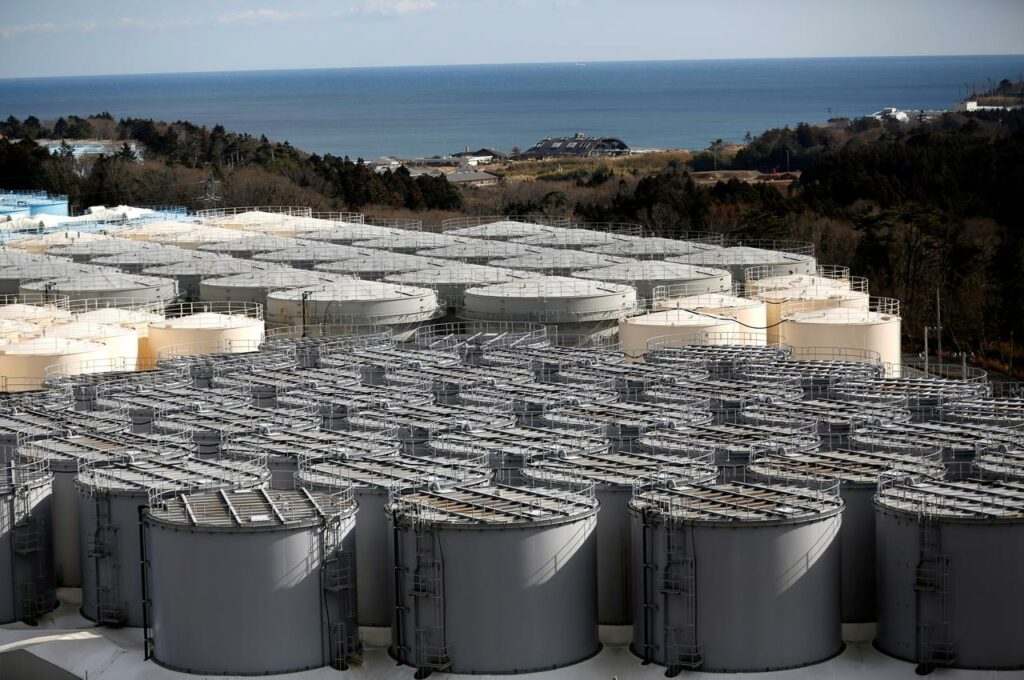Japan May Have to Dump Radioactive Water into the Sea, Minister Says
ASIA--PACIFIC, ENERGY, ENVIRONMENT, TECHNOLOGY, DEVELOPMENT, 16 Sep 2019
Reuters – TRANSCEND Media Service

Storage tanks for radioactive water are seen at Tokyo Electric Power Co’s (TEPCO) tsunami-crippled Fukushima Daiichi nuclear power plant in Okuma town, Fukushima prefecture, Japan February 18, 2019. REUTERS/Issei Kato/Files
10 Sep 2019 – Japan’s Tokyo Electric Power will have to dump radioactive water from its destroyed Fukushima nuclear power plant into the Pacific Ocean as it runs out of room to store it, the environment minister said today.
Tokyo Electric, or Tepco, has collected more than 1 million tonnes of contaminated water from the cooling pipes used to keep fuel cores from melting since the plant was crippled by an earthquake and tsunami in 2011.
“The only option will be to drain it into the sea and dilute it,” the minister, Yoshiaki Harada, told a news briefing in Tokyo.
“The whole of the government will discuss this, but I would like to offer my simple opinion.”
The government is awaiting a report from an expert panel before making a final decision on how to dispose of the radioactive water.
Japan’s Chief Cabinet Secretary Yoshihide Suga, in a separate press briefing, described Harada’s comments as “his personal opinion”.
Tepco was not in a position to decide what to do but would follow the policy once the government made a decision, a spokesman for the utility said.
The utility says it will run out of room to store the water by 2022. Harada did not say how much water would need to be dumped into the ocean.
Any green light from the government to dump the waste into the sea would anger neighbours such as South Korea, which summoned a senior Japanese embassy official last month to explain how the Fukushima water would be dealt with.
“We’re just hoping to hear more details of the discussions that are under way in Tokyo so that there won’t be a surprise announcement,” a South Korean diplomat told Reuters, requesting anonymity due to the sensitivity of bilateral ties.
South Korea’s foreign ministry said in a statement said it had asked Japan “to take a wise and prudent decision on the issue”.
Relations between the East Asian nations are already frosty following a dispute over compensation for Koreans forced to work in Japanese factories in World War Two.
Coastal nuclear plants commonly dump into the ocean water that contains tritium, an isotope of hydrogen that is hard to separate and is considered to be relatively harmless.
Tepco, which also faces opposition from fishermen, admitted last year that the water in its tanks still contained contaminants beside tritium.
“The government must commit to the only environmentally acceptable option for managing this water crisis which is long term storage and processing to remove radioactivity, including tritium,” Shaun Burnie, senior nuclear specialist with Greenpeace Germany, said in an email.
________________________________________________
Reporting by Tim Kelly; additional reporting by Hyonhee Shin in SEOUL and Aaron Sheldrick in Tokyo; Editing by Clarence Fernandez, Robert Birsel
Tags: Asia and the Pacific, Capitalism, Conflict, Economics, Environment, Fukushima, Japan, Nuclear Disaster, Nuclear Energy, Nuclear Meltdown, Nuclear Power, Nuclear Waste, Pacific Ocean, Politics, Public Health, Radioactive Waste, Science, Social justice, Solutions, World
DISCLAIMER: The statements, views and opinions expressed in pieces republished here are solely those of the authors and do not necessarily represent those of TMS. In accordance with title 17 U.S.C. section 107, this material is distributed without profit to those who have expressed a prior interest in receiving the included information for research and educational purposes. TMS has no affiliation whatsoever with the originator of this article nor is TMS endorsed or sponsored by the originator. “GO TO ORIGINAL” links are provided as a convenience to our readers and allow for verification of authenticity. However, as originating pages are often updated by their originating host sites, the versions posted may not match the versions our readers view when clicking the “GO TO ORIGINAL” links. This site contains copyrighted material the use of which has not always been specifically authorized by the copyright owner. We are making such material available in our efforts to advance understanding of environmental, political, human rights, economic, democracy, scientific, and social justice issues, etc. We believe this constitutes a ‘fair use’ of any such copyrighted material as provided for in section 107 of the US Copyright Law. In accordance with Title 17 U.S.C. Section 107, the material on this site is distributed without profit to those who have expressed a prior interest in receiving the included information for research and educational purposes. For more information go to: http://www.law.cornell.edu/uscode/17/107.shtml. If you wish to use copyrighted material from this site for purposes of your own that go beyond ‘fair use’, you must obtain permission from the copyright owner.
Read more
Click here to go to the current weekly digest or pick another article:
ASIA--PACIFIC:
- Nepal: Proto-Nationalism Entrapped in the Musical Chair Circle of Political Parties and Floundering Economy
- South Korea's Biosecurity Is Safe, Thanks to Russia
- India and Pakistan: Freedom Lost but Animosity Flourishes
ENERGY:
- China Opens World’s Largest Offshore Solar Power Facility
- Nuclear Industry Takes Control of NASA
- The Nuclear Energy Dilemma: Climate Savior or Existential Threat?
ENVIRONMENT:
- Criminal Negligence in the Degrowth Movement? Why Transformative Criminology Matters for Systemic Change
- Mother Earth Cries: They Bombed Me Again
- Climate Misinformation Turning Crisis into Catastrophe, Report Says
TECHNOLOGY:
- Software Developers in Oakland Are Putting People Over Profit
- Weaponizing Reality: The Dawn of Neurowarfare
- Israeli Intelligence to Be Granted Full Access to National Biometric Database
DEVELOPMENT: